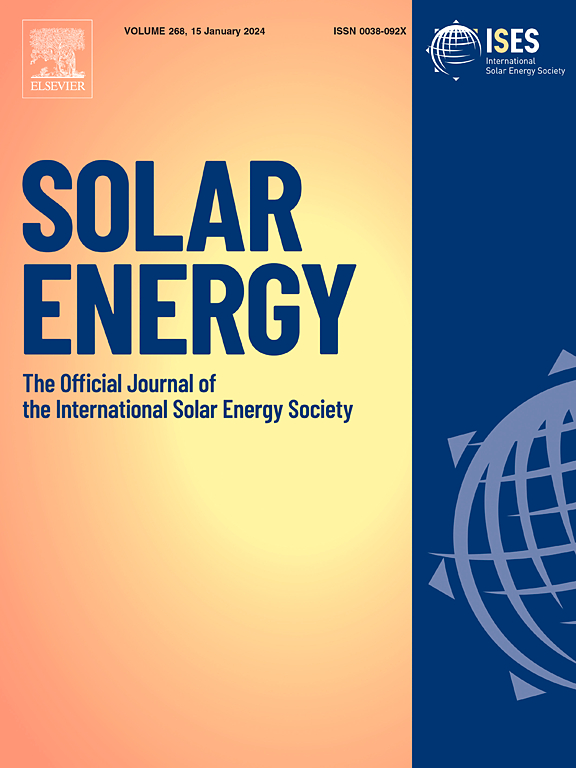Machine learning forecasts of short wave radiation from geostationary satellite measurements to optimize solar photovoltaic and concentrated solar power systems
IF 6
2区 工程技术
Q2 ENERGY & FUELS
引用次数: 0
Abstract
In the context of global energy transition and sustainable development, accurate short wave radiation (SWR) forecasting is increasingly vital for enhancing the efficiency and economic viability of solar photovoltaic (PV) and concentrated solar power (CSP) systems. This study presents an innovative machine-learning forecasting model of SWR within the next hour, using multi-band shortwave solar radiation measurements from the geostationary satellite. The model is based on a cloud cover-weighted hybrid model combining the convolutional long short-term memory (ConvLSTM) and Fourier neural operator (FNO) models. During testing, the optimized hybrid model performed better than ERA5 data, reducing the prediction error by 24.14%, the average absolute error by 38.62%, and improving the R2 value by 6.4%. In the prediction area (longitude 104–110°, latitude 35–40°), the prediction accuracy in barren and sparsely vegetated areas was 8.13% higher compared to grasslands, indicating future potential for further enhancement through optimized solar power plant site selection. The improved model can reduce power generation losses by 0.067 USD/m2 in PV systems through real-time grid regulation and other strategies, and can also prevent daily energy losses of 13.97 kWh/m2 in concentrated solar power systems by timely adjusting the heliostats and receiver measures. Under the Shared Socioeconomic Pathways sustainable development scenario (SSP1-2.6), by 2100, the adoption of the hybrid SWR forecasting model is expected to increase power generation by 895.47 TWh compared to the original plan. The proposed hybrid forecasting model significantly improves solar radiation forecast accuracy, enhancing the future development of solar power generation.
机器学习预测地球静止卫星测量的短波辐射,以优化太阳能光伏和聚光太阳能发电系统
在全球能源转型和可持续发展的背景下,准确的短波辐射(SWR)预测对于提高太阳能光伏发电(PV)和聚光太阳能发电(CSP)系统的效率和经济可行性越来越重要。本研究提出了一种创新的机器学习预测模型,利用地球静止卫星的多波段短波太阳辐射测量,预测未来一小时内的SWR。该模型基于云覆盖加权混合模型,结合了卷积长短期记忆(ConvLSTM)和傅立叶神经算子(FNO)模型。在测试过程中,优化后的混合模型比ERA5数据的预测误差降低了24.14%,平均绝对误差降低了38.62%,R2值提高了6.4%。在预测区域(经度104 ~ 110°,纬度35 ~ 40°),荒无人烟地区的预测精度比草地高8.13%,表明未来通过优化太阳能电站选址可以进一步提高预测精度。改进后的模型通过实时电网调节等策略可使光伏发电系统的发电损失减少0.067 USD/m2,并通过及时调整定日镜和接收机措施可防止聚光太阳能发电系统的日能量损失13.97 kWh/m2。在共享社会经济路径可持续发展情景(SSP1-2.6)下,到2100年,采用混合SWR预测模型预计将比原计划增加895.47太瓦时的发电量。所提出的混合预测模型显著提高了太阳辐射预测精度,促进了太阳能发电的未来发展。
本文章由计算机程序翻译,如有差异,请以英文原文为准。
求助全文
约1分钟内获得全文
求助全文
来源期刊

Solar Energy
工程技术-能源与燃料
CiteScore
13.90
自引率
9.00%
发文量
0
审稿时长
47 days
期刊介绍:
Solar Energy welcomes manuscripts presenting information not previously published in journals on any aspect of solar energy research, development, application, measurement or policy. The term "solar energy" in this context includes the indirect uses such as wind energy and biomass
 求助内容:
求助内容: 应助结果提醒方式:
应助结果提醒方式:


